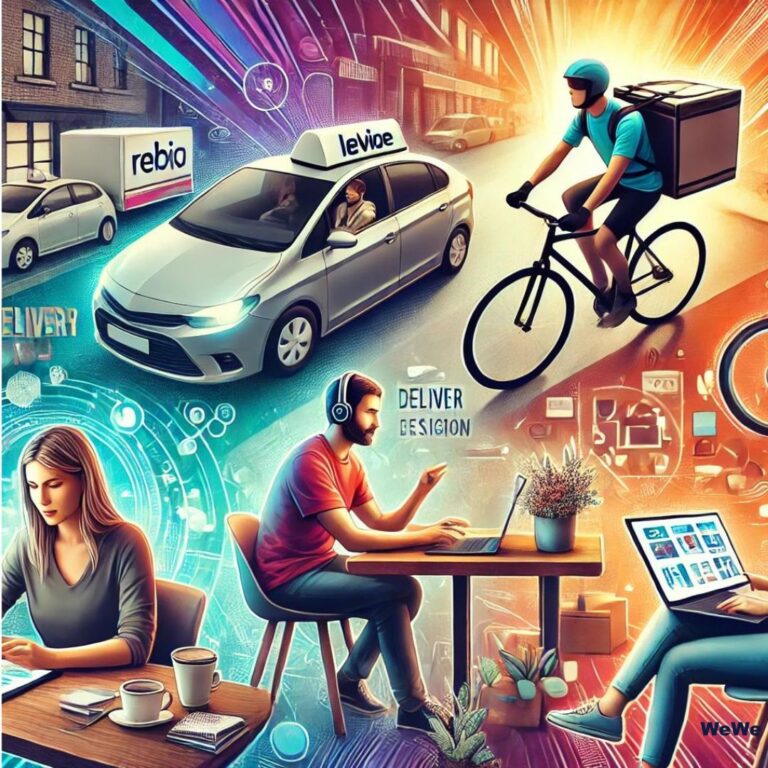The gig economy has emerged as a transformative force in the modern labor market, fundamentally changing how people work and how businesses operate. Characterized by short-term, flexible, and freelance work arrangements, the gig economy offers both opportunities and challenges. This article explores the rise of the gig economy, its impact on workers and businesses, and the future of this evolving landscape.
The Rise of the Gig Economy
The gig economy refers to a labor market characterized by the prevalence of short-term contracts or freelance work as opposed to permanent jobs. Several factors have contributed to the rapid growth of the gig economy:
- Technological Advancements:
- The proliferation of digital platforms and mobile apps has made it easier for workers to find gig opportunities and for businesses to connect with freelancers. Platforms like Uber, Lyft, Airbnb, Upwork, and Fiverr have revolutionized traditional industries by enabling on-demand services and remote work.
- Changing Workforce Preferences:
- Many workers are increasingly seeking flexibility and autonomy in their careers. The gig economy offers the freedom to choose when, where, and how to work, making it an attractive option for those who prioritize work-life balance, such as students, parents, and retirees.
- Economic Necessity:
- Economic downturns and job market fluctuations have led some individuals to turn to gig work out of necessity. The gig economy can provide a supplemental income or a bridge between traditional employment opportunities.
Impact on Workers
The gig economy has significant implications for workers, offering both benefits and drawbacks:
- Benefits:
- Flexibility: Gig workers can set their own schedules and take on as much or as little work as they want, allowing for a better work-life balance.
- Variety: Freelancers often have the opportunity to work on diverse projects and gain experience in different fields, which can be personally and professionally enriching.
- Independence: Gig work allows individuals to be their own boss, make decisions independently, and pursue their passions.
- Drawbacks:
- Income Instability: Gig work can be unpredictable, with inconsistent earnings and a lack of job security. This financial instability can be challenging for workers who rely solely on gig income.
- Lack of Benefits: Unlike traditional employees, gig workers typically do not receive benefits such as health insurance, retirement plans, or paid leave, which can impact their long-term financial well-being.
- Legal and Regulatory Challenges: The classification of gig workers as independent contractors rather than employees has sparked debates and legal challenges over labor rights, protections, and benefits.
Impact on Businesses
For businesses, the gig economy offers several advantages, but it also presents certain challenges:
- Advantages:
- Cost Savings: Hiring freelancers or gig workers can be more cost-effective than maintaining a full-time workforce, as businesses can scale their labor needs based on demand and avoid expenses related to employee benefits.
- Access to Talent: The gig economy enables businesses to tap into a global pool of talent, bringing specialized skills and expertise that may not be available in-house.
- Agility: Gig workers can be quickly onboarded to meet project-specific needs or seasonal demand, allowing businesses to remain agile and responsive to market changes.
- Challenges:
- Management and Coordination: Managing a distributed and temporary workforce can be complex, requiring effective communication, project management, and quality control.
- Worker Retention: Building a loyal and committed workforce is more challenging in the gig economy, as freelancers may prioritize flexibility and move between different opportunities frequently.
- Legal and Ethical Considerations: Businesses must navigate the legal implications of gig work, including worker classification, compliance with labor laws, and ensuring fair treatment and compensation.
The Future of the Gig Economy
The gig economy is poised to continue growing, driven by technological advancements, changing workforce dynamics, and evolving business needs. However, its future will be shaped by several key factors:
- Regulation and Policy:
- Governments and policymakers are increasingly scrutinizing the gig economy, seeking to balance the interests of workers and businesses. Future regulations may address worker classification, benefits, and protections to ensure fair treatment and financial security for gig workers.
- Technological Innovation:
- Advances in artificial intelligence, machine learning, and blockchain technology will further streamline gig work platforms, improve matching algorithms, and enhance transparency and trust in gig transactions.
- Corporate Practices:
- Businesses will need to adopt best practices for managing gig workers, fostering a supportive and inclusive environment, and leveraging gig talent strategically to drive innovation and growth.
- Worker Advocacy:
- Gig workers are becoming more organized and vocal about their rights and needs. Advocacy groups and unions may play a crucial role in shaping the future of gig work, advocating for fair wages, benefits, and working conditions.
The gig economy represents a significant shift in the world of work, offering both opportunities and challenges for workers and businesses. As this dynamic labor market continues to evolve, it will be essential for all stakeholders to navigate its complexities thoughtfully and responsibly. By embracing innovation, advocating for fair practices, and fostering a collaborative environment, the future of the gig economy can be both sustainable and inclusive.

